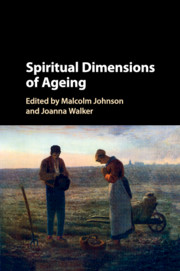1 - Spirited Ageing
Published online by Cambridge University Press: 22 December 2016
Summary
Introduction
A fundamental underlying theme of this book is that the later years are a significant time for the spiritual dimension of life, both as a resource for facing the challenges of ageing and for the potential it offers for growth and development. Spirituality is, of course, as much a part of human experience as any other normal kind of thought or behaviour, although this has not always been the view of scholars or practitioners. Furthermore, both spirituality and religion are widespread phenomena, being part of many cultures and of the lives of people of all ages and statuses. Spirituality continues to adapt and evolve new forms because it addresses people's human needs to connect meaningfully with themselves, with each other and to a higher power or larger source of meaning and purpose. Thus, the sources of spiritual inspiration and sustenance are internal, drawing on and making sense of experiences and interactions in the world as well as through any perceived transcendent connection.
However, until recently, this inner life of older people has been largely ignored or treated as problematic by gerontologists. Research is heavily directed towards physical and economic well-being and the political economy of ageing populations. The unseen dynamics of living are investigated principally in terms of physical and psychological pathologies within conventional disease paradigms or the policy challenges that they pose. This volume offers a more detailed map of the way individuals in later life experience and manage their psychological and spiritual self-identities, especially when finitude intensifies the process of life review.
Much of the current rise in interest in spirituality is related to its traditional link with health and well-being, making it a potential contributor to interventions or therapies that can improve people's lives. For instance, spiritual experiences and practices that are capable of helping establish an integrated personality are being recognised as playing a part in mental health. Older people with a developed spiritual dimension to their lives are said (in various experimentally established situations) to deal better with negative life events and their attendant stress, and to recover more quickly from illness or trauma (Mohan 2001). Such research is based on, and gives rise to further investigation of, ideas about spirituality being involved in coping, adjusting, social inclusion, mature self-identity and esteem, meaning and purpose, death awareness and so on.
- Type
- Chapter
- Information
- Spiritual Dimensions of Ageing , pp. 1 - 10Publisher: Cambridge University PressPrint publication year: 2016
References
- 1
- Cited by

